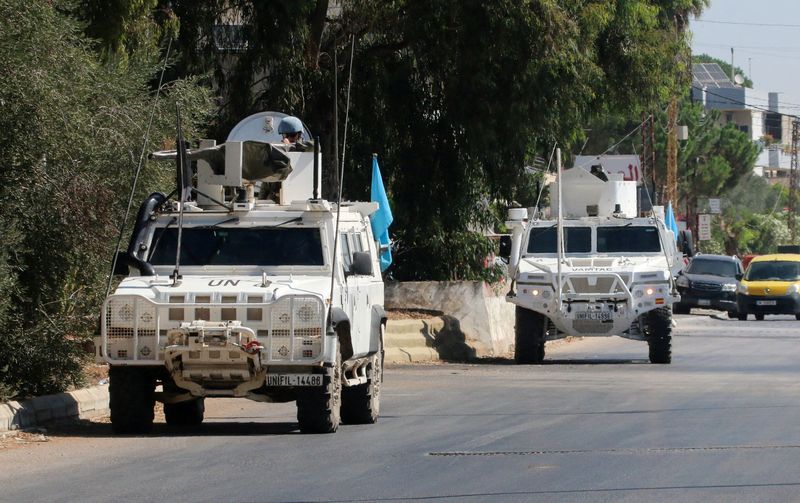UN peacekeepers in Lebanon say ‘we are staying’ despite Israeli attacks
2024.10.10 17:05
By Maya Gebeily
YARZE, Lebanon (Reuters) – United Nations peacekeepers are determined to remain at their posts in southern Lebanon despite Israeli attacks in recent days and orders by Israel’s advancing military to leave, the force’s spokesperson said on Thursday.
Andrea Tenenti said the Israeli attacks on the peacekeeping force, known as UNIFIL, on Wednesday and Thursday had wounded two of their members and knocked out some of their monitoring capabilities.
“Definitely, this is probably one of the most serious events or incidents that we’ve been witnessing in the last 12 months,” Tenenti said in an interview, referring to exchanges of fire between Israeli troops and the Lebanese armed group Hezbollah.
The force’s 50 contributing countries had agreed on Thursday to keep deploying more than 10,400 peacekeepers between the Litani River in the north and the U.N.-recognized boundary between Lebanon and Israel known as the Blue Line in the south.
“We are there because the (U.N.) Security Council has asked us to be there. So we are staying until the situation becomes impossible for us to operate,” Tenenti added.
UNIFIL said an Israeli tank fired at a watchtower at the force’s main headquarters in Naqoura on Thursday, hitting the tower and causing two peacekeepers to fall out of it.
Israeli troops also fired at a nearby position, damaging vehicles and a communications system, and on Wednesday “deliberately fired at and disabled” cameras monitoring the area, the peacekeeping force said in a statement.
Israel said its troops operated on Thursday near a UNIFIL base in Naqoura but said it instructed the U.N. forces in the area to remain in protected spaces, then opened fire.
UNIFIL is mandated by the Security Council to help the Lebanese army keep the country’s south free of weapons and armed personnel other than those of the state. That has sparked friction with Iran-backed Hezbollah, which effectively controls the area.
Tenenti said the attacks had limited the group’s monitoring abilities but that it still had crucial work to do “assisting local NGOs and also U.N. agencies, to bring the much-needed food and border to all these villages.”
About 1.2 million people have been displaced by Israel’s escalating operations in Lebanon in recent weeks, including airstrikes, artillery fire and ground incursions in the south.
“Thousands of people have left, but thousands are still stuck in this area. So deconflicting is very important. That has been very, very challenging,” Tenenti said.
U.N. agencies and journalists told Reuters that they regularly coordinate with UNIFIL when traveling to southern Lebanon to make sure all parties know they are in the area.
The Israeli military asked U.N. peacekeepers last week to prepare to relocate more than 5 km (3 miles) from the Israel-Lebanon border “as soon as possible, in order to maintain your safety,” according to an excerpt from the message seen by Reuters.
In the same period, UNIFIL sent a letter to the Israeli military objecting to army vehicles and troops positioning themselves “in immediate proximity” to U.N. positions on several occasions, including by circling Israeli Merkava tanks around their posts or parking next to them.
The letter, dated Oct. 3 and seen by Reuters, said Israeli forces had conducted “engineering works” on the outer perimeter of a U.N. peacekeeping post that resulted in the Israeli position and the U.N. post “effectively becoming one position.”

It said those activities were “endangering the safety and security of UNIFIL personnel and premises.”
The Israeli military had asked UNIFIL to withdraw from its posts in 2006, during the last major conflict between Israel and Hezbollah, according to U.N. sources. It did not withdraw at the time.








